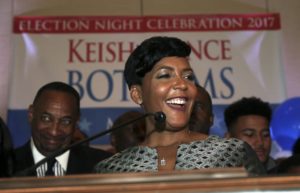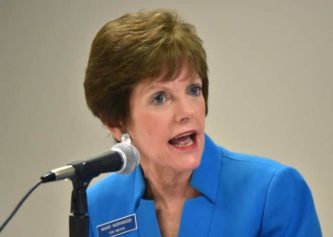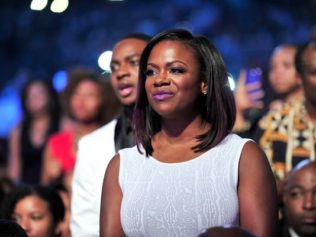
Atlanta mayoral candidate Keisha Lance Bottoms declares victory during an election-night watch party Wednesday, Dec. 6, 2017, in Atlanta. Atlanta’s two-person mayoral runoff election is too close to call. Bottoms leads Mary Norwood by a margin of less than 1 percent, which is the threshold where the second-place finisher can request a recount under state law. (AP Photo/John Bazemore)
ATLANTA (AP) — The race for mayor in Atlanta remained too close to call Wednesday, with one candidate declaring herself the city’s new leader and the other vowing to request a recount over the razor-thin margin of several hundred votes.
The runoff election on Tuesday between Keisha Lance Bottoms, who is black, and Mary Norwood, who is white, was seen as a test of the staying power of a long-dominant black political machine amid profound demographic and economic changes.
The outcome must have felt a bit like deja vu for Norwood, who trailed Bottoms by just 759 in the latest contest. Norwood was bested by current mayor Kasim Reed in a 2009 runoff by only 714 votes.
Both women are Atlanta city council members. Norwood calls herself an independent and Bottoms is Reed’s chosen successor.
A victory for Bottoms, 47, would continue a run of African-American mayors that began with Maynard Jackson in the mid-1970s.
A win for Norwood, 65, would give Atlanta its first-ever white female mayor, and end the Democratic Party’s hold on an office it has held without interruption since 1879.
Though the race has yet to be called, Bottoms spoke early Wednesday to supporters at an Atlanta hotel, telling them, “I’m so honored to be your 60th mayor.”
But Norwood took the podium at her own rally and said that absentee ballots from military members were yet to figure in the totals, and she believes some ballots have yet to be tabulated.
“We will be asking for a recount,” Norwood said.
Bottoms led Norwood by a margin of less than 1 percent, which is the threshold where the second-place finisher can request a recount under state law.
A half-century after white flight led to sprawl that fueled legendary traffic jams, Atlanta is booming economically and growing at a breakneck pace, with townhouses and apartments going up in vacant lots all over town. Parts of the city are more diverse, younger and wealthier than they have been in years.
Political analysts have said African-American voters will ultimately determine the outcome, but many of the city’s most formidable challenges transcend race. Everyone seems to care about transportation, public safety and affordable housing. As rents and home prices soar, some longtime residents struggle to stay in their neighborhoods and face no easy commutes if they move out.
“We’re behind the times in terms of having a modern transportation system compared to what you see in New York or Washington,” said Kendra A. King Momon, professor of politics at Oglethorpe University in Atlanta.
“It impacts quality of life because most of us don’t know what we’re going to run into when we head into the city,” she said of Atlanta’s notorious traffic jams. “That’s a huge issue that we have to address.”
A big question going into the runoff was whether an ongoing federal probe of corruption in city contracting under Reed’s watch would encourage voters to take a fresh look at Norwood. Some feared that as an independent who lives in the upscale Buckhead area of the city, Norwood would turn out to be a stealth Republican who will serve up City Hall to Georgia’s deep-red political apparatus.
As voters went to the polls Tuesday, none spoke openly of race.
“Just listening to Keisha and comparing what she said to the words of Ms. Norwood, I felt like she shared my values more,” said Barbara McFarlin, a 50-year-old black woman who lives in the southwest Atlanta district Bottoms has represented on the city council.
James Parson, a 49-year-old black man who also lives in Bottoms’ district, said he’s been friends with Norwood for three decades and appreciates how she’s made herself available to constituents all over the city as an at-large council member.
“I love that Mary is connected to most of the communities in Atlanta, if not all of them,” he said. “She’s approachable. She has been here. She’s no Johnny-come-lately.”
Atlanta’s last white mayor, Sam Massell, left office in 1974 and was succeeded by five African-American mayors in the next four decades: Jackson, Andrew Young, Bill Campbell, Shirley Franklin and Reed. Regardless of who wins, Atlanta will have its second female mayor, following Franklin who left office in 2010.

